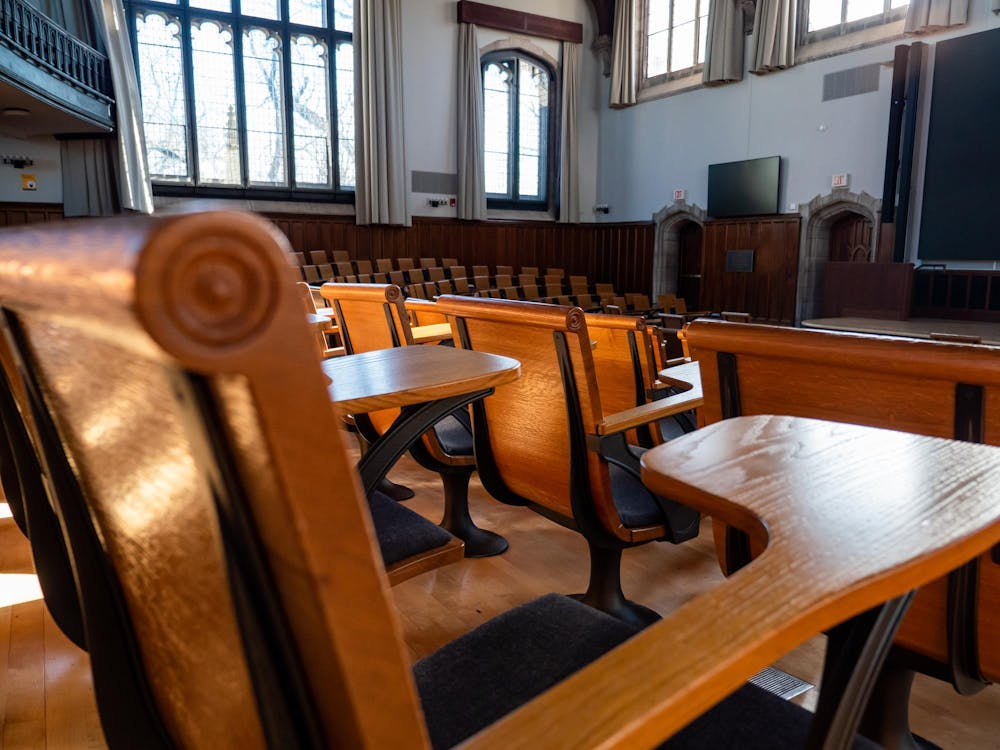Any student who dreams of becoming a molecular biologist can major in molecular biology. Any student who dreams of becoming a policy analyst should be able to enter the Woodrow Wilson School.
The Wilson School agrees, despite its rejection of 40 applicants this year. It wants to be able to admit all of its applicants. Many students think the Wilson School has a selective admissions process because its rigorous undergraduate program requires that only the most academically motivated students be admitted. This is not true.
The primary reason for the selectivity is that the Wilson School does not have enough resources to create more junior task forces, according to Stanley Katz, the Wilson School's departmental representative. Sometimes the Wilson School has difficulty convincing enough professors to teach the task forces, and the school has limited funds with which to pay task force instructors.
A secondary reason for the selectivity is the lack of professors to advise students on senior theses. Though the Wilson School has 119 faculty members listed in the Undergraduate Announcement — as opposed to the politics department, which has 47 — almost all of them are also affiliated with another department. More than half of the Wilson School's faculty members are jointly appointed to the economics department, yet fewer than half of Wilson School undergraduates write their theses in an economics-related area, according to Katz.
Provost Jeremiah Ostriker thinks the Wilson School already has enough resources to admit more students. "It is easy to see that the increase in resources over the decades allows them to teach more now than when the limit was imposed," Ostriker wrote in an e-mail.
Regardless of how many resources the Wilson School actually has, it seems that a better distribution of resources among departments would help the problem. When students are rejected from the Wilson School, they have to enter another department, such as history, politics or economics. These departments then have to create extra junior seminars to accomodate those students. Why can't funds be taken away from these departments and given to the Wilson School, so that the Wilson School can create enough task forces to admit all of its applicants?
One could argue that Wilson School juniors have task forces during both semesters, whereas other departments have a junior seminar only in the fall. But other departments are still burdened by having professors advise students on spring junior papers.
Funds could also be redistributed so that the Wilson School could hire more professors who are solely affiliated with the Wilson School, creating more thesis advisors. But because Wilson School faculty members are appointed to another department as well, senior thesis advising should not even be a reason to limit the number of Wilson School concentrators. For example, let's say Joe Smith '02 is rejected from the Wilson School. He majors in politics, and chooses Professor Jones — who is jointly appointed to the politics department and the Wilson School — as his thesis advisor. Even if the Wilson School had admitted Joe, he could have still chosen Professor Jones as his advisor.

Other departments have prerequisites to make sure that students are prepared to enter the department and have an interest in the subject. To enter the English department, you have to take ENG 201 and ENG 202, or demonstrate an interest in literature in some other way.
But the Wilson School does not only look at the applicants' interest in public policy. It looks at academic performance and GPA as well. This ability to pick out only the most intelligent students is a luxury that many departments would want, Katz speculates. Since the Wilson School suffers from a lack of resources, it feels it might as well make the best of it.
"It would be rather obtuse, if you have more applicants than you can take, to not take GPA into account," Katz said.
But past academic performance should have nothing to do with what you can major in. Public policy and international affairs do not necessarily require higher academic ability than politics, chemistry or romance languages, (and whether grades are a measure of academic ability is another question altogether). The Wilson School agrees with this principle, but disobeys it. The school is simply being greedy.

So what do we do about all of this?
First, the Wilson School immediately should eliminate GPA as a factor and make its admissions solely based on students' interest in public policy. Students should submit a list of classes they have taken instead of a transcript.
Second, the Wilson School's selective admissions process eventually should be phased out. The University administration should help redistribute funding among departments, so they can create more junior task forces and hire more professors who are solely affiliated with the Wilson School.
Some might argue that other departments are already strained. Some economics majors have graduate students, not professors, advising them on their junior papers. The distribution of resources among departments is another long-term problem. No department should have to shortchange its concentrators because of a lack of resources. But more importantly, no student should be completely shut out from the department that most sparks his or her intellectual desire. Zach Pincus-Roth is from Chevy Chase, Md. He can be reached at zacharyp@princeton.edu.







